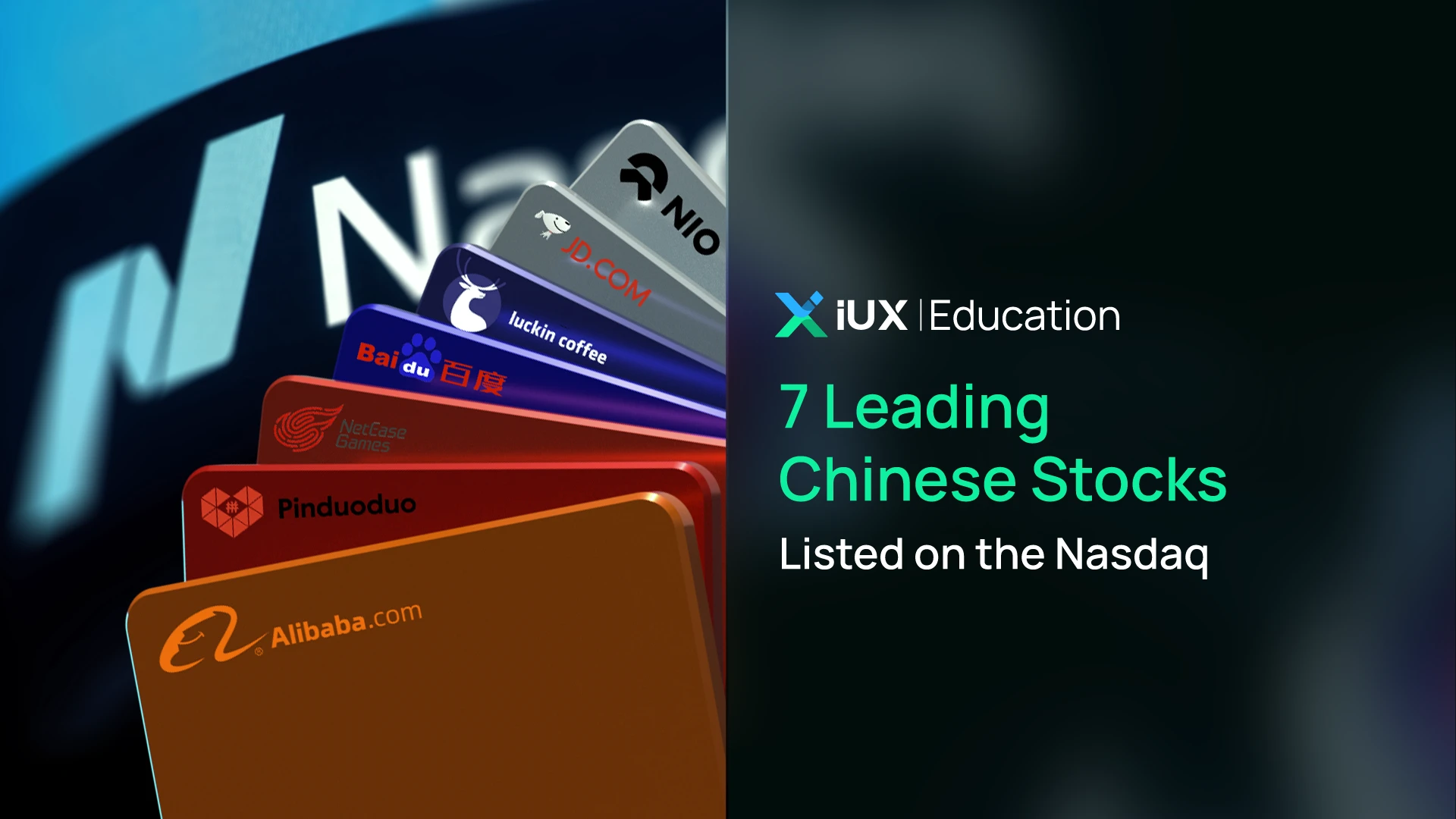CFDs are complex instruments and come with a high risk of losing money rapidly due to leverage. 76% of retail investor accounts lose money when trading CFDs with this provider. You should consider whether you understand how CFDs work and whether you can afford to take the high risk of losing your money.
CFDs are complex instruments and come with a high risk of losing money rapidly due to leverage. 76% of retail investor accounts lose money when trading CFDs with this provider. You should consider whether you understand how CFDs work and whether you can afford to take the high risk of losing your money.

7 Leading Chinese Stocks Listed on the Nasdaq
Chinese companies are increasingly making their presence felt in the global stock market, with many now listed on the Nasdaq. This powerful exchange, known for hosting some of the world’s largest tech giants, offers a platform for Chinese businesses to gain international exposure and access to capital.
In this article, we'll explore seven prominent Chinese companies listed on the Nasdaq and the sectors they represent, all while understanding how their stocks are shaping global investment trends.
1. Alibaba Group (BABA)
Sector: E-commerce, Technology
hxdbzxy / Shutterstock.com
Alibaba, established by Jack Ma in 1999, has grown from a small e-commerce company into a technology giant with diversified business segments. Its core e-commerce platforms, Taobao and Tmall, serve millions of users in China and beyond, establishing Alibaba as a household name.
What sets Alibaba apart is its innovation across various sectors, including cloud computing (through Alibaba Cloud), digital payments (via Alipay), and logistics (through Cainiao). Alibaba Cloud has become one of the largest cloud providers globally, particularly strong in Asia, offering businesses solutions in AI, machine learning, and data analytics.
Additionally, Alibaba’s investments in entertainment and media (via Youku Tudou and Alibaba Pictures) and healthcare (Alibaba Health) show its commitment to establishing an ecosystem that covers diverse consumer needs. Alibaba represents a diversified tech conglomerate with substantial growth potential, particularly as China continues to digitalize and expand its middle class.
Alibaba Group continues to drive innovation across multiple sectors, from e-commerce and cloud computing to entertainment and healthcare. These opportunities make Alibaba one of the most attractive options for investors. IUX makes it easy for you to trading in Alibaba stocks with fast trading systems, zero commissions, and the analytical tools you need for accurate decision-making. Sign up IUX to get seamless and superior investment experience!
2. Baidu (BIDU)
Sector: Internet Services, AI
The Baidu Technology Park in Beijing.Photographer: Andrea Verdelli/Bloomberg
Known as the "Google of China," Baidu dominates China’s internet search market with a market share of over 70%. Founded in 2000, Baidu has since expanded into various tech verticals, most notably artificial intelligence (AI) and autonomous driving.
Baidu has aggressively invested in AI research, particularly natural language processing and computer vision. This AI expertise has powered Baidu’s leading search engine as well as voice recognition services through its DuerOS assistant, a counterpart to Amazon's Alexa.
Baidu’s Apollo project, its self-driving car initiative, is a trailblazer in China’s autonomous vehicle landscape. By working with major automakers and regulatory bodies, Baidu aims to bring driverless cars to the market within the next few years.
3. JD.com (JD)
Sector: E-commerce, Logistics
The company's headquarters in Beijing, China. Photographer: Qilai Shen/Bloomberg
Founded in 1998, JD.com began as an electronics retailer before evolving into one of China’s largest e-commerce platforms. JD’s unique direct sales model—where it owns and sells products directly, unlike Alibaba’s marketplace model—offers a level of quality control that has earned it consumer trust.
JD is also renowned for its logistics network, which includes a fleet of delivery drones, automated warehouses, and cold chain logistics, enabling it to offer same-day or next-day delivery across much of China. JD’s commitment to logistics infrastructure gives it a competitive edge over other e-commerce platforms.
It has also branched out into technology development by establishing JD Cloud, focusing on big data, AI, and smart logistics. This infrastructure supports JD’s goal of becoming the leader in e-commerce logistics in Asia.
4. Pinduoduo (PDD)
Sector: E-commerce, Social Commerce
Chan Long Hei/Bloomberg/Getty Images
Pinduoduo, founded in 2015, brought an innovative social commerce model to China’s e-commerce space, quickly gaining popularity with a younger demographic. Unlike traditional e-commerce platforms, Pinduoduo encourages users to share product links with friends to form “shopping teams” and gain bulk discounts.
This model taps into the social aspect of online shopping, allowing Pinduoduo to offer competitive prices and appeal to a price-sensitive audience. Pinduoduo also emphasizes agriculture, providing an online marketplace for farmers to sell fresh produce directly to consumers.
This rural initiative aligns with China’s rural revitalization strategy, strengthening its brand as a socially conscious platform. Listed on the Nasdaq in 2018, Pinduoduo has rapidly expanded its user base, competing with giants like JD and Alibaba.
5. NIO (NIO)
Sector: Electric Vehicles
A Nio Inc. ET7 electric sedan at the Shanghai Auto Show. Photographer: Qilai Shen/Bloomberg
NIO, founded in 2014, has gained the nickname "Tesla of China" due to its focus on premium electric vehicles (EVs) and forward-thinking technology. With a range of electric SUVs and the recently introduced ET7 electric sedan, NIO differentiates itself with a focus on high-quality design and luxury features.
One unique service is battery swapping, where drivers can quickly swap depleted batteries for fully charged ones at NIO stations, instead of waiting for a charge. This battery-as-a-service (BaaS) model reduces the cost of ownership and makes EVs more accessible to a wider audience.
NIO’s success is largely attributed to government incentives for EV production in China and a rapidly growing demand for environmentally friendly transportation.
| Tip: When investing in foreign stocks, always check both the company’s fundamentals and the country’s regulations — strong growth means little if policies change overnight. |
6. NetEase (NTES)
Sector: Gaming, Internet Services
A pedestrian walks past the NetEase Inc. campus in Hangzhou.Photographer: Qilai Shen/Bloomberg
Founded in 1997, NetEase is one of China’s top gaming and internet companies. Its core gaming segment includes both self-developed games and collaborations with international developers like Blizzard Entertainment, with titles like “World of Warcraft” and “Overwatch” reaching Chinese gamers.
NetEase has a solid presence in mobile gaming, a booming market in China, and has expanded into education and music streaming through services like NetEase Cloud Music and Youdao. The company is focused on growing internationally, leveraging its experience in game development and partnerships to reach players worldwide.
7. Luckin Coffee (LKNCY)
Sector: Retail, Coffee
Customers sit at tables in a Luckin Coffee outlet in Beijing.Photographer: Gilles Sabrie/Bloomberg
Luckin Coffee, founded in 2017, aimed to compete with Starbucks by rapidly expanding its chain of coffee shops across China. Leveraging a digital-first approach, Luckin allows customers to order through its app and pick up their drinks at strategically located kiosks, often in high-traffic areas.
Despite an accounting scandal in 2020, Luckin has managed to rebuild its reputation and expand further, focusing on affordable and convenient coffee. Its offerings include a variety of coffee drinks and ready-to-drink products, with a focus on attracting busy, young professionals.
Luckin’s growth is driven by its tech-savvy, cashless system, and affordable pricing strategy.
Conclusion
These seven companies offer a diverse view of China’s influence on the Nasdaq and global markets, representing industries from e-commerce and gaming to electric vehicles and coffee. Each of these stocks provides a unique opportunity for international investors to tap into China’s economic growth and innovation.
However, investing in foreign stocks comes with challenges, particularly in terms of regulatory risks and market volatility. For those looking to diversify their portfolios with international exposure, understanding these companies and their sectors provides valuable insight into China’s evolving position in the global economy.
💡FAQs
Q: Why do Chinese companies list on Nasdaq?
A: Nasdaq offers global visibility, access to international investors, and credibility among leading tech companies — ideal for innovation-focused sectors like AI, e-commerce, and EVs.
Q: Are these Chinese stocks risky?
A: They carry growth potential but also risks from regulations, U.S.–China relations, and currency changes. Research and diversification help reduce exposure.
Q: Can investors outside the U.S. buy them?
A: Yes. Investors can access Chinese Nasdaq-listed stocks through international brokers that provide trading on U.S. exchanges.
Note: This article is for informational purposes only and does not constitute investment advice.
photo :CardMapr.nl / unsplash.com
Source 1




